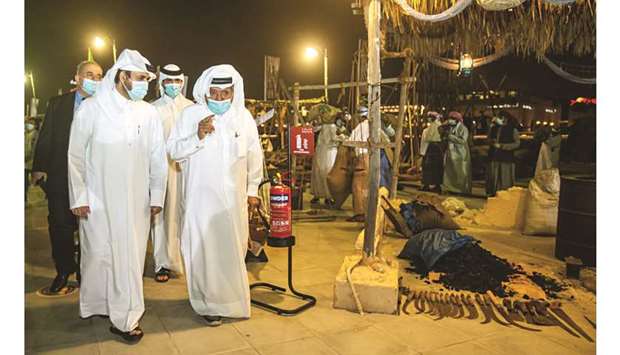The 10th Katara Traditional Dhow Festival, featuring a host of attractions and activities, continued as the second day of the event witnessed visits by a number of dignitaries, including some ambassadors.
The festival is being held in compliance with protocols set by the Ministry of Public Health to prevent the spread of Covid-19. Qatar Red Crescent Society volunteers are ensuring adherence to the precautionary measures, which include mandatory checking of the Ehteraz app status and social distancing, Katara – the Cultural Village Foundation has said in a statement.
The festival will continue to receive visitors from 10am to 10pm today and on Saturday. Tomorrow, it will remain open from 1pm to 11pm. The festival features a number of heritage pavilions from the participating countries – Qatar, Oman, Kuwait, Iraq, India and Tanzania.
Qatar’s extensive sea culture and methods are displayed in different ways each year at the decade-old festival. And each year it is uniquely highlighted for the younger generations to learn from, the statement notes. Qatar’s pavilion, Bayt Al-Ezwa, has been divided into two parts: the diving section and the traditional fishing methods section, including Al-Tawash and Al-Nakhudah, informs Jassim Abdel-Rahman al-Mannai.
“Six other types of traditional boats used in Qatar for deep-sea diving, which are smaller than ships and called the Sanbuk and Gilboot, are also on display. Details of Qatari ships used for sea travel in olden times, including Al-Bateel, are also depicted,” he added.
Further exploring the Qatari deep-sea diving culture, Qatar Museums has displayed models of boats used in the olden times.
Reda Moussa al-Hajj, supervisor of the Heritage Boats Department at Qatar Museums, said, “We consider ourselves participants and contributors since the first edition of the festival. Every year, we display historic old boats but this year, we have restricted ourselves to some valuable heritage models that have ceased to exist now.
“These boats were used in the days of diving and old trade, in addition to some original models, which were made in Qatar. They exist from the time of the opening of the old museum and have been preserved as they are, and are very rare.”
Kuwait has brought along a model of a ‘water ship’ used in that country during the last century.
Explaining its importance, Mubarak al-Khashdi, said, “In Kuwait, like the rest of the Gulf countries, water was scarce and they carried Shatt al-Arab (a water reservoir) on the ship, which the children of the current generation do not know. This is an opportunity for them to learn about this past.
“We are participating in the festival for the 10th year, and for me personally this is the third time. Our pavilion includes most of the old crafts with which Kuwaiti sailors used to make ships, using boxes and things that people used at home in the forties.”
As for the response, he said: “A very good turnout of visitors. We are glad that everyone from all generations gets to learn about the heritage.”
The Tanzania tent is showcasing handicrafts and spices of the country. Zamzam Hran, managing the pavilion, said: “We have presented various photographs from Zanzibar and from a number of traditional ports and connections with Gulf countries that had trade relations with Zanzibar. We also have Zanzibar spices and some handicrafts that show our common heritage and history with the region.”
Another attraction at the festival is the presence of artists painting the sea, boats and live imagery. “Be it a boat sailing in the sea, or a jet boat speeding in the waters or a child playing on the beach. Or even an abstract like a modern art. The canvas of these artists themselves is huge and diverse,” the statement points out.
Russian artist Kristina Aladwan, member of the Qatar Fine Arts Society, is attempting a large 3D art painting of a traditional dhow. Even as a lot of her work is on display alongside as a gallery, Kristina is painting outside in the open and keeps attracting onlookers and curious enquirers.
“Back here and painting, I feel very good because things have started to get back to real life following the pandemic,” she says. “It’s been five years for me since I have been painting the traditional Qatari boats and it is my favourite subject. That’s why I like to be at this festival each year. I am again hoping to complete a special painting from the imagery here by the time the festival nears its end.
“What I try and do is capture all the details visually and depict them as I paint. I try and create a 3D effect so that people can get a real feel of like how you would see something with your own eyes for real.
“First, I make a sketch using pencils because each detail is to be looked at. After that, I use colours just as they are in the original imagery.”
Similarly, attracting a lot of attention is Qatari artist Fouz Saif, a former member of Qatar Fine Arts Society. Her painting initially looks like an architectural work or a sketch. “I draw this using a charcoal. Actually, this involves a mixed method with charcoal and pastel,” she explains. “It is special in a way... because I am a pastel artist, I paint a lot of water pastels but this time at this festival I am using a different pastel.”
Fouz says a lot of visitors like the paintings and some even ask them to make similar artworks for them. Meanwhile, the first of the competitions – Hadaq Al Syf – saw many registrations. This is a solo fishing competition in the sea. The biggest catch will be adjudged on the final day of the festival on Saturday.

Prominent Qatari entrepreneur HE Sheikh Faisal bin Qassim al-Thani with Katara general manager Dr Khalid bin Ibrahim al-Sulaiti at the dhow festival.
